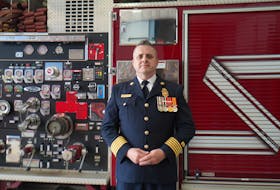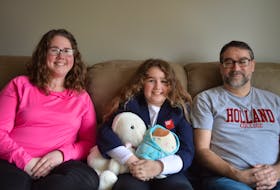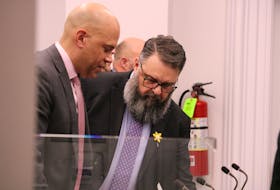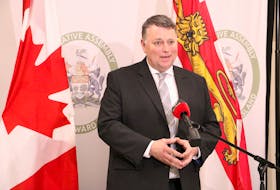Ash Arsenault is now beginning to recognize himself whenever he looks into a mirror.
The 23-year-old transgender Charlottetown resident is almost four months into the process of transitioning physically from female to male.
Testosterone injections have hardened Arsenault’s muscles, caused more hair to grow and changed his voice. However, the outward changes have only confirmed what Arsenault has felt inside for a long time.
“I just feel more comfortable when I look at myself, it’s gradually getting better and better,” he said during an interview with The Guardian.
While growing up, Arsenault said he had a strong opposition to anything female and felt like he didn’t fit in.
“I was always really shy, I didn’t like my voice or anything about my appearance,” said Arsenault, a graduate of UPEI who will soon be moving to Montreal for grad school. “I was always wanting to shop in the boys section even when I was like four or five-years-old… I always just assumed I was like a tomboy.”
It was around Arsenault’s 19th birthday when he stumbled upon a video blog of another individual’s journey of transitioning from female to male. That led Arsenault into looking deeper into the trans community.
“It just kind of clicked. I was really relating to them and I saw myself in them,” he said. “I kind of had to accept them before I could accept myself, if that makes sense. I didn’t really come out to anybody until I was 22 so there was a lot of time of just self reflection.”
While Arsenault acknowledges there is “progress to be made” around acceptance of trans individuals, he said he has never experienced any “major negative” reactions from the general public. Finding acceptance in the medical community has been a different story.
“It’s just one hoop to jump through after another. I shouldn’t have more negative reactions from people in the medical field than just from everyday people.”
The main difficulty has been finding someone to inject Arsenault with testosterone, a procedure that has to be done every two weeks.
While administered through a standard intramuscular injection, something Arsenault hopes to one day be able to do himself, he has already gone through three individuals to provide the hormone in the past three months. He now gets it administered at a clinic, which means a two-hour plus wait for a 30-second shot.
“They’re not really willing to learn or look into doing it, even though they know you can have a lot of trouble finding someone willing to do it. It does affect a lot more people than others realize.”
P.E.I. and New Brunswick are the only provinces in Canada that don’t offer some form of coverage for hormones and surgery related to gender reassignment. That can make a huge difference for Arsenault going forward, since he plans on taking testosterone for the rest of his life.
With the term of “trans” being somewhat vague, it doesn’t define one specific thing and can involve none or numerous surgeries.
Arsenault is pursuing surgery for a double mastectomy, something he is hoping to have performed in about a year from now.
While having access to hormones and surgery has been limited in P.E.I., Arsenault has also received major support since making the announcement last year.
“My brother now refers to me as his brother, it’s phenomenal. My mom has been really great with trying to help me find resources and doing some advocating for trans rights,” said Arsenault.
Arsenault and his girlfriend, who have been dating for several years, have also felt an acceptance within the LGBTQ community on P.E.I. and are planning on attending some of the events during Pride Week this week.
“We definitely enjoy all of that stuff, it just feels like a great community and we definitely feel like we're part of it.”
Ash Arsenault is now beginning to recognize himself whenever he looks into a mirror.
The 23-year-old transgender Charlottetown resident is almost four months into the process of transitioning physically from female to male.
Testosterone injections have hardened Arsenault’s muscles, caused more hair to grow and changed his voice. However, the outward changes have only confirmed what Arsenault has felt inside for a long time.
“I just feel more comfortable when I look at myself, it’s gradually getting better and better,” he said during an interview with The Guardian.
While growing up, Arsenault said he had a strong opposition to anything female and felt like he didn’t fit in.
“I was always really shy, I didn’t like my voice or anything about my appearance,” said Arsenault, a graduate of UPEI who will soon be moving to Montreal for grad school. “I was always wanting to shop in the boys section even when I was like four or five-years-old… I always just assumed I was like a tomboy.”
It was around Arsenault’s 19th birthday when he stumbled upon a video blog of another individual’s journey of transitioning from female to male. That led Arsenault into looking deeper into the trans community.
“It just kind of clicked. I was really relating to them and I saw myself in them,” he said. “I kind of had to accept them before I could accept myself, if that makes sense. I didn’t really come out to anybody until I was 22 so there was a lot of time of just self reflection.”
While Arsenault acknowledges there is “progress to be made” around acceptance of trans individuals, he said he has never experienced any “major negative” reactions from the general public. Finding acceptance in the medical community has been a different story.
“It’s just one hoop to jump through after another. I shouldn’t have more negative reactions from people in the medical field than just from everyday people.”
The main difficulty has been finding someone to inject Arsenault with testosterone, a procedure that has to be done every two weeks.
While administered through a standard intramuscular injection, something Arsenault hopes to one day be able to do himself, he has already gone through three individuals to provide the hormone in the past three months. He now gets it administered at a clinic, which means a two-hour plus wait for a 30-second shot.
“They’re not really willing to learn or look into doing it, even though they know you can have a lot of trouble finding someone willing to do it. It does affect a lot more people than others realize.”
P.E.I. and New Brunswick are the only provinces in Canada that don’t offer some form of coverage for hormones and surgery related to gender reassignment. That can make a huge difference for Arsenault going forward, since he plans on taking testosterone for the rest of his life.
With the term of “trans” being somewhat vague, it doesn’t define one specific thing and can involve none or numerous surgeries.
Arsenault is pursuing surgery for a double mastectomy, something he is hoping to have performed in about a year from now.
While having access to hormones and surgery has been limited in P.E.I., Arsenault has also received major support since making the announcement last year.
“My brother now refers to me as his brother, it’s phenomenal. My mom has been really great with trying to help me find resources and doing some advocating for trans rights,” said Arsenault.
Arsenault and his girlfriend, who have been dating for several years, have also felt an acceptance within the LGBTQ community on P.E.I. and are planning on attending some of the events during Pride Week this week.
“We definitely enjoy all of that stuff, it just feels like a great community and we definitely feel like we're part of it.”








